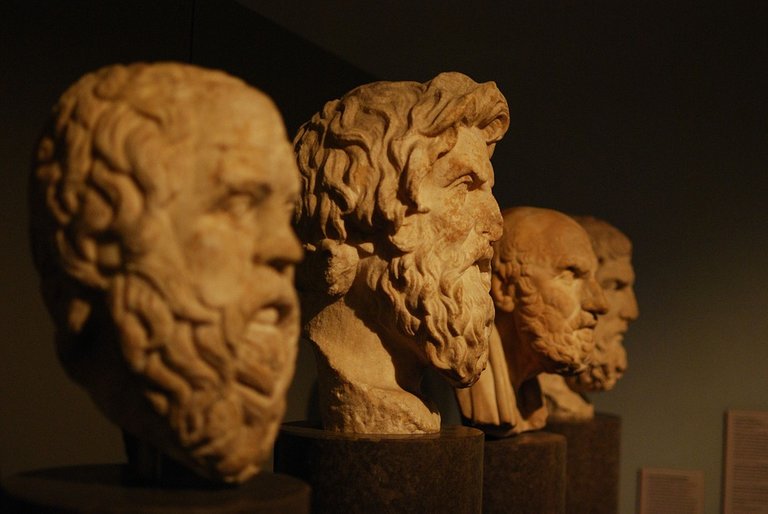In this essay I wish to discuss ideas and philosophies of life, not to promote my opinion of right and wrong but from an objective and comparative perspective, as seen through the philosophies of the world’s diverse cultural perspectives. Unless we know and learn from our history, we are destined to repeat it. A wise person learns from the mistakes of others, or from hearing good advice. A regular person learns from their own experience and mistakes, despite having been given good advice. And a fool never learns, neither from good advice or from personal mistakes and goes on to repeat the same mistakes again.

All of us can learn a great deal about our human condition by studying the lessons of our ancestors, those who walked this planet before us and confronted the same challenges that we face today. Our world’s literatures are full of information regarding the affairs of humanity from all the cultures and all periods of time throughout history. Although the times may change, the human plight remains the same and the same choices confront us as did civilizations hundreds of years ago as well as thousands of years ago.
There is – in reality – no ancient practice versus modern practice for it’s all the same journey and a continuation of the same human condition, even though the externals may change slightly. The mind of humanity, despite our wish for the contrary, is exactly as it was throughout the history of human life on earth. We are still faced with exactly the same challenges as were the ancient tribes or small city states or kingdoms of our past. Therefore by studying their plights and how they dealt with those challenges, we can learn from their experience and not have to relearn via the school of hard knocks that which our ancestors have already learnt.
Those of us reading this in English may presumably be primarily raised in a predominantly Judeo-Christian culture with all its morals and ethics. However, there are other equally valid or, at least, powerful cultural frames of reference not only from our past but even today, right now that also need to be considered, for better or worse. Naturally our westernized ethos is also steeped in Greek and Roman influence. Our law courts and judiciary are founded on their principles. Our parliaments and politics are based on their systems, those same systems used in the Roman Empire over 2000 years ago.
However, we are a multicultural world which is also emerging into a multi-polar political playing field, with various divergent cultural frames of reference and all the morals and ethics which they espouse. Sometimes these concur but often they conflict with each other. Therefore, to think that our subjective conditioned perspective of life on earth is the only way or the best way to live may very well clash with someone from – say for example – the Sharia culture of Islam or the atheistic Communism of modern China. To take a fundamentalist stance on any of these divergent philosophies will surely lead to a clash of cultures.
In fact that clash already exists and had been going on for centuries, if not millennia. This is the sometimes harsh reality of our human condition and always has been – at least for the past few thousand years, as far back as we can remember, based on our historical records. As a result, our personal ideals, for example like those of peace as espoused by Judeo-Christian piety, or even Hindu and Buddhist “ahimsa” (non-violence) may well be good on paper, or in the halls of armchair philosophers or the temples of monks and mystics in the remote hills, but in reality, on the ground, they may be naive and impossible to achieve.
As long as there are divergent cultures vying for power and dominance or even just personal self-interest on this ever-shrinking global village of a planet, there are going to be clashes. Those clashes occur as wars, invasions and genocides where no amount of prayers for peace are going to protect you, no matter how pious you may wish to consider yourself.
Just ask the Tibetan Buddhists who were systematically invaded and murdered in cold blood during Mao Zedong’s Communist invasion of Tibet in the 1950s. Just ask the Palestinians who were systematically invaded and undergo genocide still to this day under the jackboots of the Israeli occupiers and settlers. Just ask the Bosnians and Serbs of eastern Europe who engaged in Islamic fundamentalist warfare in the late 1990s. Or any other opponent of Islamic fundamentalism today.
Just ask the Muslim Uighurs of western China who are being systematically “re-educated” as their culture is smashed by the Communist Chinese dictatorship right now. Peace and co-habitation, based on the naive idealistic philosophy of Christ or Buddha, is glorious in theory but impossible in practice if you want your culture to survive because there will always be someone else who will see your pacifism as weakness and simply wipe you out. History proves this time and again.
(image pixabay)
The invasion of Tibet by Chineses has spread the Tibetan culture all over Europe.
From one bad thing, a new good thing emerges.
Yes that's a good point Chris, there is always hope.
Your content has been voted as a part of Encouragement program. Keep up the good work!
Use Ecency daily to boost your growth on platform!
Support Ecency
Vote for Proposal
Delegate HP and earn more
Many thanks Ecency, I appreciate your positive response.